Editor’s Note: This story has been updated to correct quotation errors.
Sergiy Kyslytsya, Ukrainian Ambassador to the United Nations, spoke in front of students and faculty on Sept. 4 evening in Rauch Business Center, as Lehigh marked the 20th anniversary of the LU/UN Partnership.
Lehigh was the sixth university to gain UN Non-Governmental Organization accreditation leading to the creation of the partnership, according to Lehigh’s Office of International Affairs.
This event was one of approximately 30 UN Ambassador visits, according to Lehigh’s Ambassador Speaker Series.
Bill Hunter, director of fellowship advising and UN programs, said it’s extraordinary that the ambassador chose to visit during the height of the Russia-Ukraine war.
“You can only imagine what his schedule involves every day and the tremendous stress and pressure he and his countrymen are under,” Hunter said. “I’m deeply thankful to him and the Ukrainian mission to the UN for making this visit possible.”
Kyslytsya opened his speech with a confession to attendees that current global orders aren’t working for anyone.
“Our role is facing existential challenges, but the global community is more segmented and divided than at any time during the past 75 years,” Kyslytsya said. “Even the Cold War era was, in some ways, less dangerous.”
He said the creation of the UN Charter and Security Council at the Yalta Conference in 1945 doesn’t meet the challenges of the 21st century.
Kyslytsya also said if there are any serious business matters in the UN, imminent members of the Security Council believe they should only be decided and discussed by the Security Council,
“All other little workers can play in the sandbox of the General Assembly,” Kyslytsya said.
Following the opening remarks was a Q&A session with the ambassador, in which multiple students volunteered questions on topics related to war and diplomacy, humanitarian needs, education and the future of Ukraine.
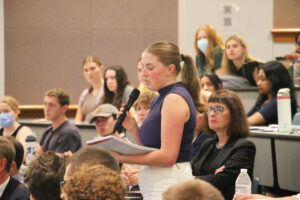
Amelia Chandless ’26 was one of multiple students who volunteered questions during the Q&A. Chandless asked whether or not the role of the U.S. has contributed to tensions between Russia and Ukraine. (Lauren Slovensky/B&W Staff)
Grace Williams, ‘27, is double majoring in international relations and Russian and she’s an executive board member of the United Nations Association chapter at Lehigh.
She said it’s rare that the Ukrainian Ambassador to the UN would come to Lehigh during a war.
“Ukraine has completely been attacked… and it’s so unfair to the country,” Williams said. “So the fact that he’s willing to come here in such a trying, trying time in their history is amazing.”
Oksana Koziak, a Bethlehem resident, was invited to attend the event and said she was doubly interested in coming because of her Ukrainian heritage.
Koziak said she was interested to hear about the history of the UN, Russia’s not signing the UN Charter, and its role on the Security Council and Human Rights Council.
“Sometimes you say, ‘Why isn’t the UN not doing more?’” Koziak said. “But, I think if you get an understanding of the issues behind it, then you can understand a little bit better what some of the obstacles are.”
Kyslytsya said the Security Council will tell the Russian Federation that they are designated as the aggressor state.
“The United Nations has no armed forces to enforce the decisions,” Kyslytsya said. “The United States is not allowed to strike the military bases in the Russian Federation.”
Hunter said the ambassador’s role regarding sanctions and funding is tricky for the UN because he has to build partnerships to support the war effort. However, he thinks the relationship between the U.S. and Ukraine is healthy because both entities value one another.
“The U.S. is a major Ukrainian ally (and) a major supplier of arms in the fight against Russia,” Hunter said. “He needs us, and we need Ukraine to remain and retain a democracy. So there’s a give and take there.”
Rhema Hooper, ‘27, is a Lehigh UN Youth Representative. During the Q&A, she asked the ambassador how Ukraine utilizes its diplomatic engagement to promote and highlight its cultural heritage.
Hooper said she liked how Kyslytsya answered the question head-on and wished he could’ve talked for longer.
“I loved how he reiterated that the United States as a nation is a key partner with Ukraine,” Hooper said.
Hunter said he wished there was time for more questions, but the Ambassador’s answers were so elaborate and telling that everyone received a tremendous history lesson.
Kyslytsya said Russia has destroyed art, objects and museums in Ukraine.
He said millions of Ukrainian students are in a “terrible program” as they are unable to attend regular educational institutions. To combat this, Ukraine has arrangements where students attend school in other countries including Poland, Canada and New Zealand.
Kyslytsya said young people around the world can contribute to peace efforts by being responsible citizens, studying a lot and educating themselves.
Hunter said events like these give students the opportunity to sit across the table from global decision-makers.
“Last year we had four first-year students become UN Youth Representatives, with the opportunity to speak at the United Nations just one month after arriving on campus,” Hunter said. “You can’t do that at any other university in the world, so do not miss that opportunity.”

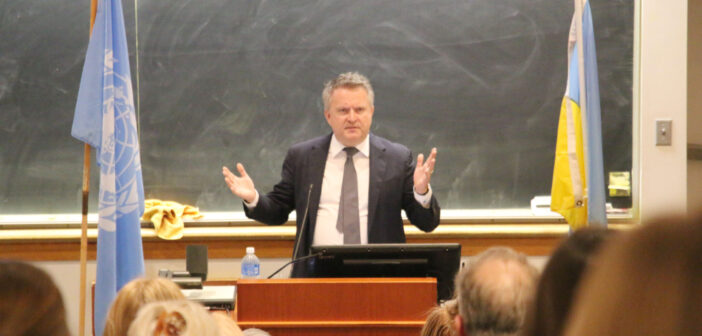

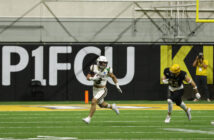
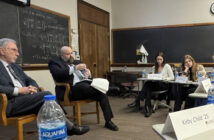
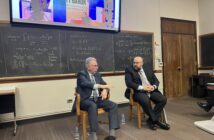
Comment policy
Comments posted to The Brown and White website are reviewed by a moderator before being approved. Incendiary speech or harassing language, including comments targeted at individuals, may be deemed unacceptable and not published. Spam and other soliciting will also be declined.
The Brown and White also reserves the right to not publish entirely anonymous comments.